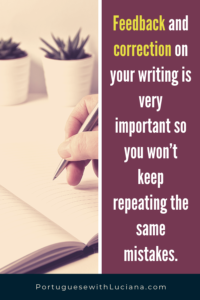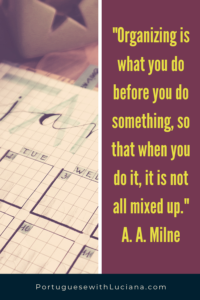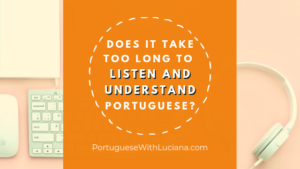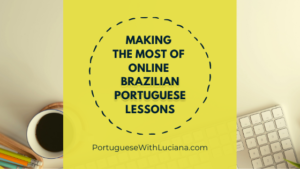 During our test lesson, or when students are starting to take lessons, they often ask me how many lessons a week they should take to be able to speak Portuguese in X months or how long it’s going to take for them to be fluent in Portuguese. I’ve also asked these questions to my language teachers – I think it’s a kind of anxiety that’s part of the language learning process unless you are an experienced learner.
During our test lesson, or when students are starting to take lessons, they often ask me how many lessons a week they should take to be able to speak Portuguese in X months or how long it’s going to take for them to be fluent in Portuguese. I’ve also asked these questions to my language teachers – I think it’s a kind of anxiety that’s part of the language learning process unless you are an experienced learner.
These questions are really hard to answer. There are estimates of the number of hours needed to learn languages, some people claim it’s possible to learn in a couple of months, others say you have to study a fixed number of hours per day. So, this is what I tell my students:
- It’s very important to study between lessons (As a teacher, I can tell the difference between students who study between lessons and those who don’t! When they study regularly, the lesson flows easily. When they don’t, I notice that they have a certain difficulty remembering things – it’s harder for the student. I just find this interesting to observe, no judgment 🙂 ).
- I prefer that a student work with me once or twice a week and study outside of class. This is more effective than taking many lessons each week, but having no contact with Portuguese outside of our time together.
Of course, there are exceptions and then, we need different strategies. For this blog post, I want to focus on the regular student, not one that needs to learn really fast or just wants conversation practice. Those are different cases.
So now that you have some info from the teacher’s perspective, I’ll put some ideas as links to use to have contact with Portuguese between lessons.
I’ve separated this article in sections below so you can go directly to the ones that are most important for you:
Listening
I learned Italian through music. But I used to listen to the same singer EVERY SINGLE DAY and read the lyrics. My family hated me. I was a superfan of Laura Pausini. I used to go to her concerts whenever she was in Brazil, bought some stuff just for fans, had an autographed CD and took pictures with her bandmates (sadly, never with her). When I started working and earning my own money, I saved just to go to her concerts.
I’m telling you this because I tried to study other languages with music, but it didn’t work as well as it worked with Italian. And I believe it’s because I’m not a fan of any singer now – by the way, I can’t listen to Laura Pausini anymore because I listened to her too much.
If you want to study with songs, you have to sit and study and not put background music in Portuguese and think the lyrics and vocabulary are entering your head, translations and all. It won’t work. But if you are listening, reading, repeating, noticing how the singers connect and pronounce the words, paying attention to expressions, idioms, and collocations, then you’ll learn.
And there are many things you can do with music:
- a vocabulary notebook
- flashcards
- translation
- listen and read, listen and repeat
- just listen and try to understand the words
- listen and try to write down the words you hear, then compare with the lyrics
- read about the songs or singers and learn why they wrote it – if that’s the case (like many Brazilian protest songs from the 60’s and 70’s)
Here you’ll find my activities with Brazilian music at Didaski.com and here you can find the songs on Spotify.
But listening to music is not the only thing you can do to practice listening. You can also listen to podcasts or watch videos. And here I’ll repeat what I said above, you have to actively listen to it. It’s not background sound. With podcasts and videos, you can apply all the ideas from above.
Some suggestions:
- Brazilpod: I always recommend this site to students, they have a lot of listening material (free and paid). Look for the projects in the box (Clica Brasil, Tá Falado, etc). Different levels, with transcription.
- Fala Gringo is a great podcas for intermediate students.
You can use podcasts or videos as a speaking topic for the lesson. You first learn/study the podcast by yourself, take notes and use what you learned to talk. You can also use the topic of the podcast to practice writing! It’s also good practice for Celpe-Bras.
Reading
You can read news, if you like or if you need to stay up to date with what is happening in Brazil. But, you have to develop some system to remember vocabulary you read and learn the pronunciation of more difficult words.
If you want to read only about one subject in the news, like soccer, as an example, you’ll learn words by repetition. But if you read about everything, you’ll see a lot of different vocabulary and it may be harder to remember everything.
Personally, I prefer reading books or short stories to the news. You can look for crônicas, colunas, contos, and blogs in Portuguese. You can find colunas and crônicas on news websites, like this one from Folha de S. Paulo.
You can use this site – Releituras to find Brazilian writers and short stories (contos e crônicas). You can look for blogs about any subject you like, like this one about trips, with stories and tips. If you are more advanced, you can read books, too.
I like to work with crônicas and contos with my student because:
- They are stories with beginnings, middles, and ends
- They can read and study between lessons
- It’s a quick read; if they need they can read twice or more
- They learn vocabulary and use it in the lesson to talk about the story
- They learn cultural aspects
- We can compare with the literature of the student’s home country
- The student feels good reading authentic material
Again, if you are reading to study, you have to find a way to retain vocabulary, like creating a vocabulary notebook or flashcards. Most of my students use Anki and I know it has many possibilities of use. I haven’t used it, but instead, I’ve created some flashcards on Memrise.
Some suggestions:
- Folha de S. Paulo, Estadão, BBC em Português, Revista Piauí: are all news media. Revista Piauí is good for advanced students, as their texts are longer and the vocabulary is more complicated.
- Superinteressante: articles are simpler and also good to use in the lessons or with language exchange partners, as they present a lot of info good for conversation.
- Uol: it’s a portal and you can find pages related to many subjects.
- Globo.com: Globo controls much of the media in Brazil. If you look for G1, GE, GShow in the upper left part of the site you’ll see each of their newspapers, magazines, TV shows, radio stations.
Writing
 Writing is my favorite activity when I’m learning a new language. Many students don’t like writing or don’t see how it can help in their speaking (normally the students’ main goal).
Writing is my favorite activity when I’m learning a new language. Many students don’t like writing or don’t see how it can help in their speaking (normally the students’ main goal).
When you write you have to stop and think, look up words, conjugate verbs, change words to masculine, feminine, singular and plural and if you don’t know how to do that, you have to check that information, so it’s a form of studying. And, of course, all that you learned while you were writing will be applied when speaking.
Feedback and corrections on your writing are very important so you don’t keep repeating the same mistakes. You can ask for correction on social media (Facebook groups, for example), but be careful and analyze the answers you get because I’ve seen many strange answers on social media. If you want to try writing correction exchange, there’s a platform called Lang-8, but I’ve never used it. LingQ also has writing exchange.
Some suggestions:
- Write a diary (but if you want corrections, don’t write personal/secret thoughts)
- Write your opinion on subjects you have listened to or read.
- Use writing prompts. You can find many online if you don’t have any idea on what to write.
- Practice for the writing part of Celpe-Bras.
- If you like social media, you can use it to post your writings.
Speaking
Speaking between lessons can be tricky if you don’t live in a Portuguese speaking country or don’t have family and friends who speak Portuguese around. And even if you do, it’s not easy to just switch languages.
My husband is from Spain, but since we met our language has always been Portuguese (with a bit of written English in the beginning). We lived in Brazil in our first three years together. When we moved to Spain and I started studying Spanish, we tried to speak Spanish at home. But I just couldn’t change our language to practice Spanish. It felt really bad; we weren’t communicating. So, our official language has remained Portuguese, with a little Spanish thrown in here and there.
Some suggestions:
- Try to find language exchange partners online
- Think of a subject and record your speaking
- Find or create language exchange groups in your city
Organizing
 I know that I didn’t suggest very many sites and apps to study in this post and there are other pages online with extensive lists of resources, but be careful with them! Be careful not to just keep looking for resources only to never actually use them to study!
I know that I didn’t suggest very many sites and apps to study in this post and there are other pages online with extensive lists of resources, but be careful with them! Be careful not to just keep looking for resources only to never actually use them to study!
You don’t need 100 links with 20 authors and 50 texts per author to practice reading, you need just one text. You read it, study, create flashcards, write a paragraph and talk to someone about it, then you move to the next one.
I’d suggest you to use one or two of your favorite resources to study and divide your time between them. When you finish what you have chosen or you want to make some changes, just substitute with a new resource.
For example:
- You can choose one podcast to listen to on your commute (you can listen to the same episode twice).
- When you are at home, you can repeat it and write down what you understood.
- If there is a transcription, you can read to the transcription and compare it to what you wrote.
- Then you can listen to it again while you read the transcription and pay attention to the way the words are linked and pronounced.
- You can make a list of vocabulary to revise afterward.
- You can look up the words you didn’t understand.
- You can look for more info about the subject of the podcast and practice reading, if you find something that interests you.
- You can write a paragraph about it, give your opinion, or imagine you are writing to the author of the podcast.
- Use your vocabulary list when you are talking to your teacher/language exchange partner about it (so you practice the words you learned)
- If there is new grammar/structure you can practice with a grammar book.
This example is just for you to see how much you can do with just one episode of a podcast. I’m sure you’ll have many hours of work with the ideas above and you’ll practice all the skills needed in language learning – not to mention cultural aspects if you are using authentic material!
As you can see, organization is key here. It’s important to have some resources, but not so many – that you feel overwhelmed and don’t know what to do with them. You should like them and they should be according to your level. Then you need space and time for language learning. Write down what you are going to do first, second, etc. If you study with a text one week, you can change to a video the other week. You should also remember to stop from time to time and just review. Taking some time off from language learning is a good idea, too, so your brain can process all the new information.
Remember: more important than having lots of sites, books, and apps to study Portuguese is to have a few good ones and organize them well! Revise from time to time and analyze your progress.
I hope this post helps you, but if you have questions or suggestions, leave me a comment below!




Oi Luciana. Great blog and links. Muito Obrigado.
Obrigada pelo comentário! 🙂